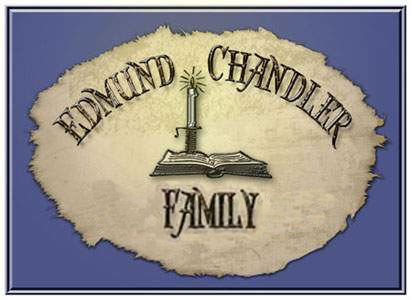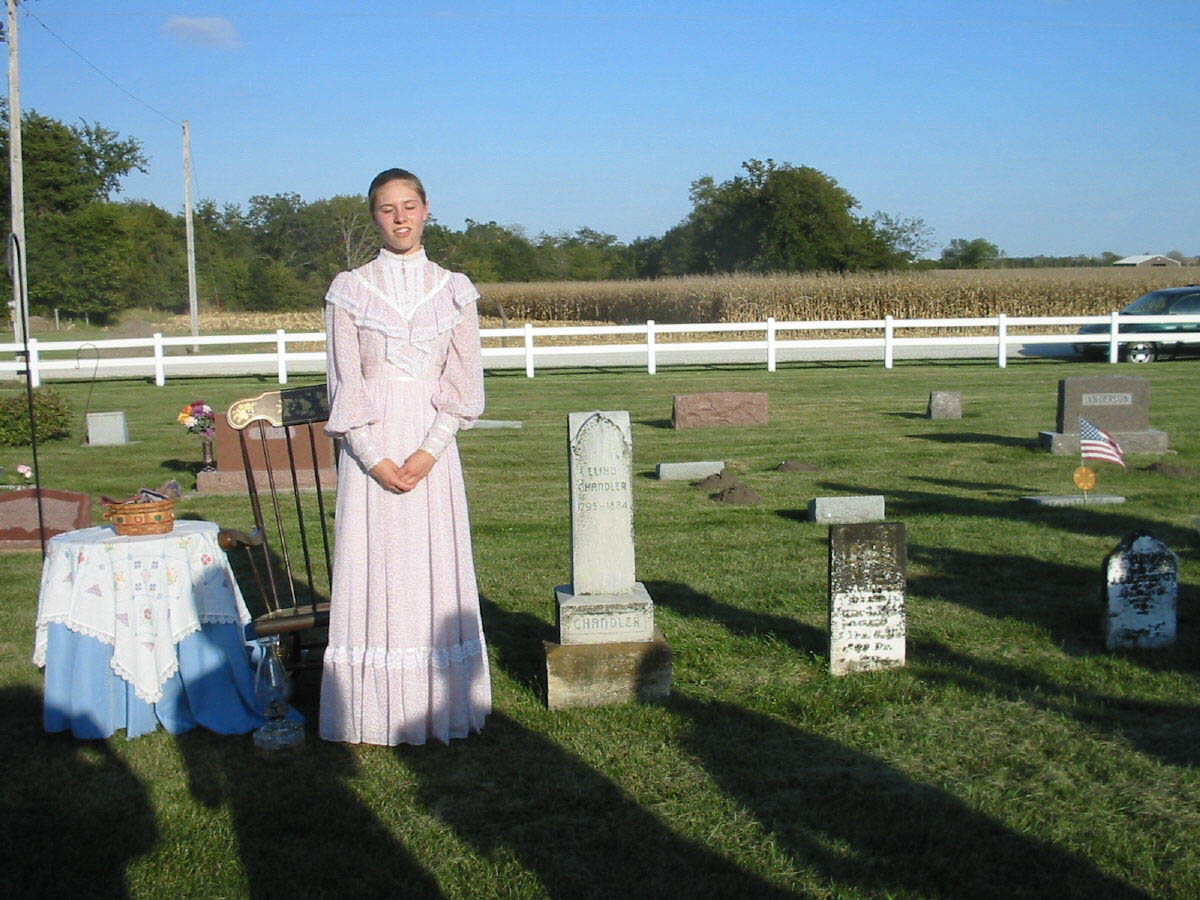
CFA Chapter 13
|
Chapter 13 home page |
Return to Stories & Letters
Jemima Dobson
 This picture is of the ggggg-granddaughter of Jemima Dobson Chandler talking about Jemima’s life. The talk was given in Prairie Grove cemetery, where she and Elihu are buried. The cemetery is on the Henry-Des Moines county line in Iowa. |
TEXT OF PRESENTATION
My name is Jemima Chandler. In Kentucky I was considered strong-minded. Strong-willed too, I suppose. At seventeen I married Mr. James Dobson, and together we began a family that included four children. But nine years later I found myself a widow. Life gives us adversity. One must pick up. One must move on.
What does a young women of 26 do with four young children? I perhaps surprised even myself with the decision to moved to this new territory-Iowa. It was 1834. The territory had been opened to settlers for over a year. At age 30 I decided there was nothing to loose and everything to gain, so here we arrived where I joined my sister. We were given squatters right, until the land was surveyed, which did not begin until 1836; land sales did not begin until 1838.
Here I met Elihu. Mr. Chandler had traveled from Maine to Ohio in 1830,and then to Henderson County, Illinois. This was during the Black Hawk War, and he was engaged in building and guarding the rude fort in that county.
Elihu was one of the first to cross the Mississippi River and engage in the arduous task of creating a new life in this undeveloped country. He arrived in 1834, when Burlington-or Pinhook as it was once referred to-had only two or three cabins.
It didn’t take long to recognize a good man. Elihu and I married in June of 1835.
Life in this new land was always an adventure. The first years were difficult for pioneer families. There was usually little or no money, nowhere to buy anything, and often a shortage of food until the first crop could be harvested.
Indians were numerous and usually friendly. Mrs. Burge related that once she returned to her home only to find several Indians in the hut, one holding the baby and others talking to the children. Suppressing her panic, she bought out food to offer the guests, who ate greedily and left in good humor.
We could always find plenty of bees in the area trees, and honey and beeswax were exchanged in Burlington for supplies that took us through the winter. Elihu made many trips to Burlington with a team of oxen, leaving early in the morning and returning at near to 2:00 a.m. the next morning!
We pounded grain in the hollowed-out top of a stump, Indian-fashion, to make meal for eating. Wolves sometimes scratched on the door at night, and livestock had to be well guarded. Indians were seen almost daily.
Soon the land was offered for sale and we were able to purchase 320 acres for $1.25 an acre. Of course, we had chosen this area for it plentiful wood and wild game.
The forest, the floods, the savage, all disputed our progress, but with stout hands and stouter hearts, we weathered the years.
Adversity?
Of course, but as I said it can break you-or you can take troubles by the heel and turn them inside out.”
NOTES: JEMIMA CHANDLER DOBSON
According to the Mathis Family History; Hepsiba “Hepsy” Philpott Mathis (Jemima’s mother) and Jemima’s sister Hepsiba Mathis and Jemima traveled from Kentucky to Iowa in 1834. That fall they helped organize the Long Creek–now Danville Baptist Church.
Died at her home in Baltimore township, in Henry county, Iowa, Mrs. Jemima Chandler 84. She was born in Greene County, Kentucky August 18, 1804. Married James Dobson, July 11, 1822, he died September 27, 1831. She came to Iowa, and married Elihu Chandler June 1835.” – Burlington Daily Hawkeye April 16, 1888.



